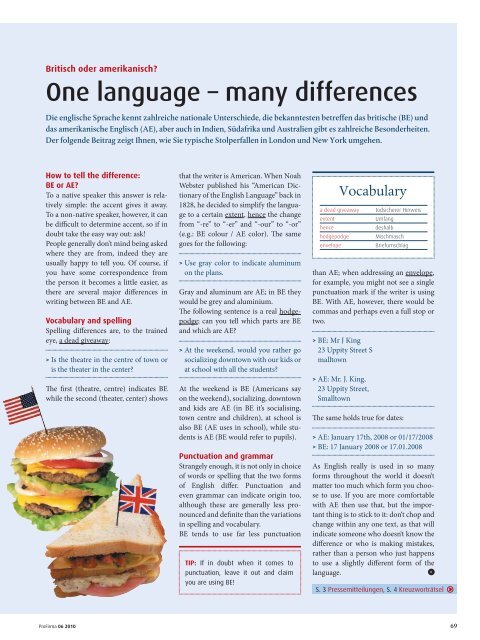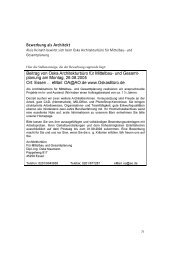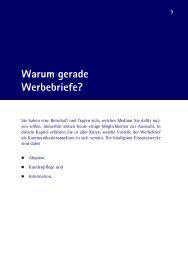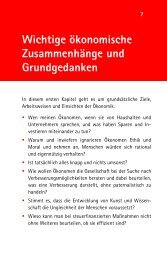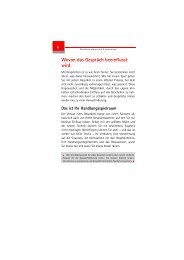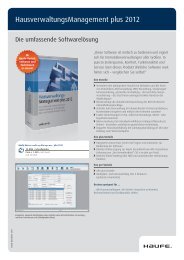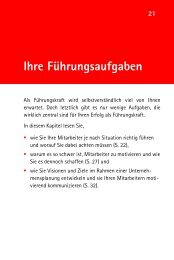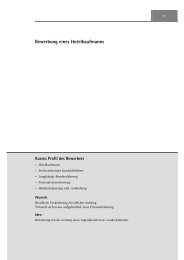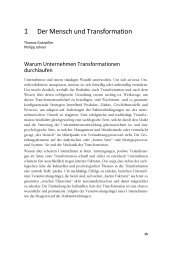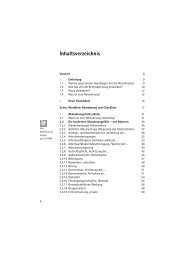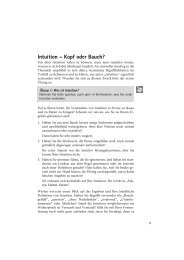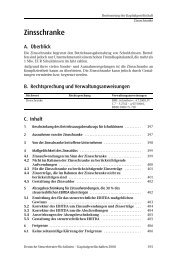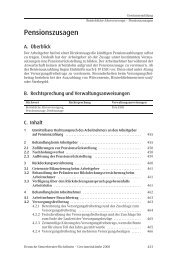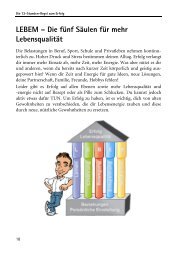DIE GROSSE
DIE GROSSE
DIE GROSSE
Sie wollen auch ein ePaper? Erhöhen Sie die Reichweite Ihrer Titel.
YUMPU macht aus Druck-PDFs automatisch weboptimierte ePaper, die Google liebt.
Britisch oder amerikanisch?<br />
One language – many differences<br />
Die englische Sprache kennt zahlreiche nationale Unterschiede, die bekanntesten betreffen das britische (BE) und<br />
das amerikanische Englisch (AE), aber auch in Indien, Südafrika und Australien gibt es zahlreiche Besonderheiten.<br />
Der folgende Beitrag zeigt Ihnen, wie Sie typische Stolperfallen in London und New York umgehen.<br />
How to tell the difference:<br />
BE or AE?<br />
To a native speaker this answer is relatively<br />
simple: the accent gives it away.<br />
To a non-native speaker, however, it can<br />
be diffi cult to determine accent, so if in<br />
doubt take the easy way out: ask!<br />
People generally don’t mind being asked<br />
where they are from, indeed they are<br />
usually happy to tell you. Of course, if<br />
you have some correspondence from<br />
the person it becomes a little easier, as<br />
there are several major diff erences in<br />
writing between BE and AE.<br />
Vocabulary and spelling<br />
Spelling diff erences are, to the trained<br />
eye, a dead giveaway:<br />
> Is the theatre in the centre of town or<br />
is the theater in the center?<br />
Th e fi rst (theatre, centre) indicates BE<br />
while the second (theater, center) shows<br />
ProFirma 06 2010<br />
that the writer is American. When Noah<br />
Webster published his “American Dictionary<br />
of the English Language” back in<br />
1828, he decided to simplify the language<br />
to a certain extent, hence the change<br />
from “-re” to “-er” and “-our” to “-or”<br />
(e.g.: BE colour / AE color). Th e same<br />
goes for the following:<br />
> Use gray color to indicate aluminum<br />
on the plans.<br />
Gray and aluminum are AE; in BE they<br />
would be grey and aluminium.<br />
Th e following sentence is a real hodgepodge;<br />
can you tell which parts are BE<br />
and which are AE?<br />
> At the weekend, would you rather go<br />
socializing downtown with our kids or<br />
at school with all the students?<br />
At the weekend is BE (Americans say<br />
on the weekend), socializing, downtown<br />
and kids are AE (in BE it’s socialising,<br />
town centre and children), at school is<br />
also BE (AE uses in school), while students<br />
is AE (BE would refer to pupils).<br />
Punctuation and grammar<br />
Strangely enough, it is not only in choice<br />
of words or spelling that the two forms<br />
of English diff er. Punctuation and<br />
even grammar can indicate origin too,<br />
although these are generally less pronounced<br />
and defi nite than the variations<br />
in spelling and vocabulary.<br />
BE tends to use far less punctuation<br />
TIP: If in doubt when it comes to<br />
punctuation, leave it out and claim<br />
you are using BE!<br />
Vocabulary<br />
a dead giveaway todsicherer Hinweis<br />
extent Umfang<br />
hence deshalb<br />
hodgepodge Mischmasch<br />
envelope Briefumschlag<br />
than AE; when addressing an envelope,<br />
for example, you might not see a single<br />
punctuation mark if the writer is using<br />
BE. With AE, however, there would be<br />
commas and perhaps even a full stop or<br />
two.<br />
> BE: Mr J King<br />
23 Uppity Street S<br />
malltown<br />
> AE: Mr. J. King,<br />
23 Uppity Street,<br />
Smalltown<br />
Th e same holds true for dates:<br />
> AE: January 17th, 2008 or 01/17/2008<br />
> BE: 17 January 2008 or 17.01.2008<br />
As English really is used in so many<br />
forms throughout the world it doesn‘t<br />
matter too much which form you choose<br />
to use. If you are more comfortable<br />
with AE then use that, but the important<br />
thing is to stick to it: don‘t chop and<br />
change within any one text, as that will<br />
indicate someone who doesn‘t know the<br />
diff erence or who is making mistakes,<br />
rather than a person who just happens<br />
to use a slightly diff erent form of the<br />
language.<br />
S. 3 Pressemitteilungen, S. 4 Kreuzworträtsel<br />
69


